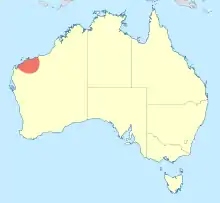Antipodogomphus hodgkini
Antipodogomphus hodgkini is a species of dragonfly of the family Gomphidae,[2] known as the Pilbara dragon.[3] It is endemic to the Pilbara region of Western Australia, where it inhabits rivers, streams and pools.[4]
| Pilbara dragon | |
|---|---|
| Scientific classification | |
| Domain: | Eukaryota |
| Kingdom: | Animalia |
| Phylum: | Arthropoda |
| Class: | Insecta |
| Order: | Odonata |
| Infraorder: | Anisoptera |
| Family: | Gomphidae |
| Genus: | Antipodogomphus |
| Species: | A. hodgkini |
| Binomial name | |
| Antipodogomphus hodgkini | |
 | |
Antipodogomphus hodgkini is a small to medium-sized black and yellow dragonfly with a long tail.[5]
Antipodogomphus hodgkini was discovered and named by Tony Watson and Gunter Theiscinger in Western Australia in 1969. [6]
Gallery
.jpg.webp) Female wings
Female wings.jpg.webp) Male wings
Male wings
See also
References
Wikimedia Commons has media related to Antipodogomphus hodgkini.
- Watson, J.A.L. (1969). "Taxonomy, ecology, and zoogeography of dragonflies (Odonata) from the north-west of Western Australia". Australian Journal of Zoology. 17 (1): 65–112 [97]. doi:10.1071/ZO9690065.
- "Species Antipodogomphus hodgkini Watson, 1969". Australian Faunal Directory. Australian Biological Resources Study. 2012. Retrieved 19 February 2017.
- Theischinger, Günther; Hawking, John (2006). The Complete Field Guide to Dragonflies of Australia. Collingwood, Victoria, Australia: CSIRO Publishing. p. 186. ISBN 978-0-64309-073-6.
- Theischinger, Gunther; Endersby, Ian (2009). Identification Guide to the Australian Odonata. Department of Environment, Climate Change and Water NSW. p. 191. ISBN 978-1-74232-475-3.
- Watson, J.A.L.; Theischinger, G.; Abbey, H.M. (1991). The Australian Dragonflies: A Guide to the Identification, Distributions and Habitats of Australian Odonata. Melbourne: CSIRO. p. 278. ISBN 0643051368.
- Endersby, Ian (2011). "Watson and Theischinger: the etymology of the dragonfly (Insecta: Odonata) names which they published" (PDF).
This article is issued from Wikipedia. The text is licensed under Creative Commons - Attribution - Sharealike. Additional terms may apply for the media files.